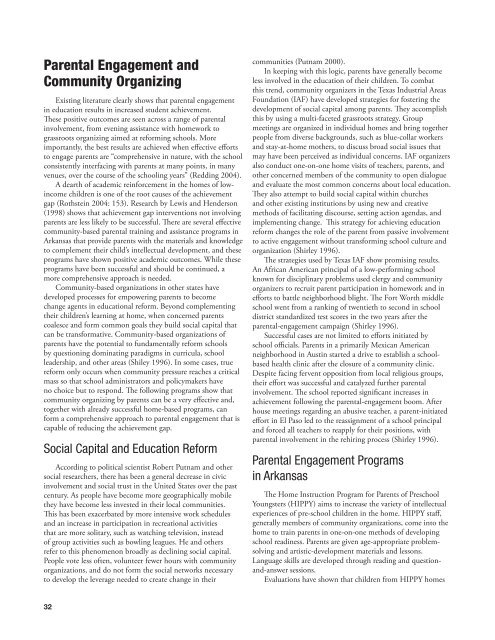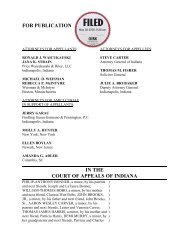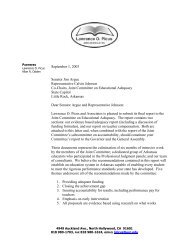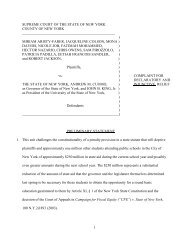WHAT IS ARKANSAS DOING TO CLOSE THE ACHIEVEMENT GAP?
WHAT IS ARKANSAS DOING TO CLOSE THE ACHIEVEMENT GAP?
WHAT IS ARKANSAS DOING TO CLOSE THE ACHIEVEMENT GAP?
Create successful ePaper yourself
Turn your PDF publications into a flip-book with our unique Google optimized e-Paper software.
Parental Engagement and<br />
Community Organizing<br />
Existing literature clearly shows that parental engagement<br />
in education results in increased student achievement.<br />
These positive outcomes are seen across a range of parental<br />
involvement, from evening assistance with homework to<br />
grassroots organizing aimed at reforming schools. More<br />
importantly, the best results are achieved when effective efforts<br />
to engage parents are “comprehensive in nature, with the school<br />
consistently interfacing with parents at many points, in many<br />
venues, over the course of the schooling years” (Redding 2004).<br />
A dearth of academic reinforcement in the homes of lowincome<br />
children is one of the root causes of the achievement<br />
gap (Rothstein 2004: 153). Research by Lewis and Henderson<br />
(1998) shows that achievement gap interventions not involving<br />
parents are less likely to be successful. There are several effective<br />
community-based parental training and assistance programs in<br />
Arkansas that provide parents with the materials and knowledge<br />
to complement their child’s intellectual development, and these<br />
programs have shown positive academic outcomes. While these<br />
programs have been successful and should be continued, a<br />
more comprehensive approach is needed.<br />
Community-based organizations in other states have<br />
developed processes for empowering parents to become<br />
change agents in educational reform. Beyond complementing<br />
their children’s learning at home, when concerned parents<br />
coalesce and form common goals they build social capital that<br />
can be transformative. Community-based organizations of<br />
parents have the potential to fundamentally reform schools<br />
by questioning dominating paradigms in curricula, school<br />
leadership, and other areas (Shiley 1996). In some cases, true<br />
reform only occurs when community pressure reaches a critical<br />
mass so that school administrators and policymakers have<br />
no choice but to respond. The following programs show that<br />
community organizing by parents can be a very effective and,<br />
together with already successful home-based programs, can<br />
form a comprehensive approach to parental engagement that is<br />
capable of reducing the achievement gap.<br />
Social Capital and Education Reform<br />
According to political scientist Robert Putnam and other<br />
social researchers, there has been a general decrease in civic<br />
involvement and social trust in the United States over the past<br />
century. As people have become more geographically mobile<br />
they have become less invested in their local communities.<br />
This has been exacerbated by more intensive work schedules<br />
and an increase in participation in recreational activities<br />
that are more solitary, such as watching television, instead<br />
of group activities such as bowling leagues. He and others<br />
refer to this phenomenon broadly as declining social capital.<br />
People vote less often, volunteer fewer hours with community<br />
organizations, and do not form the social networks necessary<br />
to develop the leverage needed to create change in their<br />
communities (Putnam 2000).<br />
In keeping with this logic, parents have generally become<br />
less involved in the education of their children. To combat<br />
this trend, community organizers in the Texas Industrial Areas<br />
Foundation (IAF) have developed strategies for fostering the<br />
development of social capital among parents. They accomplish<br />
this by using a multi-faceted grassroots strategy. Group<br />
meetings are organized in individual homes and bring together<br />
people from diverse backgrounds, such as blue-collar workers<br />
and stay-at-home mothers, to discuss broad social issues that<br />
may have been perceived as individual concerns. IAF organizers<br />
also conduct one-on-one home visits of teachers, parents, and<br />
other concerned members of the community to open dialogue<br />
and evaluate the most common concerns about local education.<br />
They also attempt to build social capital within churches<br />
and other existing institutions by using new and creative<br />
methods of facilitating discourse, setting action agendas, and<br />
implementing change. This strategy for achieving education<br />
reform changes the role of the parent from passive involvement<br />
to active engagement without transforming school culture and<br />
organization (Shirley 1996).<br />
The strategies used by Texas IAF show promising results.<br />
An African American principal of a low-performing school<br />
known for disciplinary problems used clergy and community<br />
organizers to recruit parent participation in homework and in<br />
efforts to battle neighborhood blight. The Fort Worth middle<br />
school went from a ranking of twentieth to second in school<br />
district standardized test scores in the two years after the<br />
parental-engagement campaign (Shirley 1996).<br />
Successful cases are not limited to efforts initiated by<br />
school officials. Parents in a primarily Mexican American<br />
neighborhood in Austin started a drive to establish a schoolbased<br />
health clinic after the closure of a community clinic.<br />
Despite facing fervent opposition from local religious groups,<br />
their effort was successful and catalyzed further parental<br />
involvement. The school reported significant increases in<br />
achievement following the parental-engagement boom. After<br />
house meetings regarding an abusive teacher, a parent-initiated<br />
effort in El Paso led to the reassignment of a school principal<br />
and forced all teachers to reapply for their positions, with<br />
parental involvement in the rehiring process (Shirley 1996).<br />
Parental Engagement Programs<br />
in Arkansas<br />
The Home Instruction Program for Parents of Preschool<br />
Youngsters (HIPPY) aims to increase the variety of intellectual<br />
experiences of pre-school children in the home. HIPPY staff,<br />
generally members of community organizations, come into the<br />
home to train parents in one-on-one methods of developing<br />
school readiness. Parents are given age-appropriate problemsolving<br />
and artistic-development materials and lessons.<br />
Language skills are developed through reading and questionand-answer<br />
sessions.<br />
Evaluations have shown that children from HIPPY homes<br />
32






